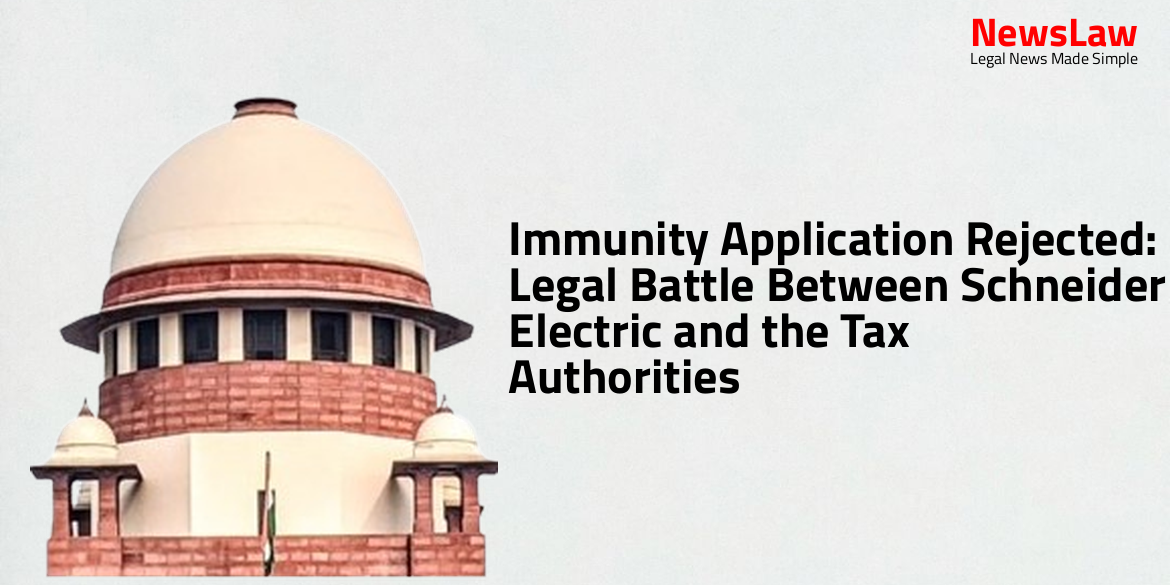Delve into the detailed legal analysis conducted by the court regarding the interpretation of a shared household under the Domestic Violence Act. The case sheds light on the exhaustive definition provided in the Act and the implications it carries for cases involving domestic disputes. Stay informed on the legal intricacies surrounding shared residences in the context of domestic violence proceedings.
Facts
- Plaintiff filed an application under Order XII Rule 6 CPC on 05.01.2018 for passing a decree based on admissions by the defendant in the application under Section 12 of Act, 2005.
- Property in question is self-acquired by the plaintiff through an agreement dated 12.01.1983 and a registered conveyance deed dated 14.07.2003.
- Plaintiff acquired the house from the previous owner, Kulbhushan Jain on 12.01.1983.
- The Trial Court decreed the suit in favor of the plaintiff for mandatory and permanent injunction, directing the defendant to hand over vacant possession of the property within 15 days.
- Defendant filed an application on 23.09.2017 for production of documents under Order XI Rules 12 and 14 CPC.
- The appellant’s son was married to the respondent on 04.03.1995, leading to marital discord between them.
- The Trial Court directed the impleadment of the son in the suit by invoking its powers under Order I Rule 10 CPC, as requested by the respondent.
- The learned Chief Metropolitan Magistrate passed an interim order on 26.11.2016 preventing alienation of the shared household without court orders.
- Plaintiff’s suit sought mandatory injunction, removal of defendant from the property, and relief from false cases filed by the defendant.
- Plaintiff, a heart patient, pleaded threats and violence against his wife by the defendant.
- Defendant claimed the property was acquired through joint-family business, not self-acquired.
- The Trial Court directed plaintiff to file an affidavit and documents under Order XI Rule 13 CPC, which the plaintiff complied with.
- Plaintiff’s suit mentioned divorce proceedings initiated by son against the respondent and the withdrawal of the relief for damages.
- Respondent filed an application under Section 12 of Act, 2005 against plaintiff and others, post the divorce petition by the son.
- Defendant admitted plaintiff’s ownership of the property in her pleadings in the domestic violence case.
- Decree sheet to be prepared for the relief of permanent and mandatory injunction
- No order as to costs
- File to be consigned to record room
- Copy of judgment to be given dasti
- Defendant filed RFA No.381 of 2019 in the High Court of Delhi against Trial Court’s judgment
- Delhi High Court heard RFA along with five other RFAs
- High Court set aside Trial Court’s decree and remanded the matter for fresh adjudication
- Matters remanded back to Trial Court in accordance with directions in paragraph 56 of the judgment
- High Court noticed facts of different appeals and submissions made by counsel
Also Read: Transfer of Writ Petitions for Chartered Accountants’ Tax Audit Guidelines
Issue
- The High Court refrained from determining whether the suit premises is a shared household due to pending domestic violence proceedings initiated by the daughter-in-law.
- The Trial Court passed a decree without considering the statutory right of the appellant under the Domestic Violence Act.
- The High Court set aside the impugned judgments and directed the Trial Court to consider the appellant’s admission regarding the respondent’s ownership rights, provide alternate accommodation if the appellant’s defense is her right of residence under the DV Act, and grant interim orders if ownership rights are disputed.
- The Trial Court must ensure the provision of suitable alternate accommodation under Section 19(1)(f) of the DV Act until the subsistence of the matrimonial relationship.
- Adequate safeguards should be in place to secure alternate accommodation for the appellant during the proceedings, with directions to be completed within 6 months.
Also Read: Analyzing Interference with Acquittal in Legal Conviction Case
Arguments
- Respondent, in her written statement, claimed that she has been residing in the shared household since her marriage on 4th March 1995.
- She asserted that the shared household was acquired through joint family funds and not the plaintiff’s self-acquired property.
- The respondent contended that she has the right to stay/reside in the shared household as per the Protection of Women from Domestic Violence Act, 2005.
- Allegations of physical and mental torture by the plaintiff, his wife, and their elder son were made by the respondent in her defense.
- The respondent stated that the suit property is her shared household, and she has the right to residence in it.
- The respondent further argued that the suit brought by the plaintiff is in conflict with her right to reside in her matrimonial/shared household as envisaged by the Act, 2005.
- The respondent mentioned that she has been living in the joint family setup post her marriage, indicating her entitlement to reside in the shared household.
- The respondent disputed the plaintiff’s claim of sole ownership of the house and stated that it was acquired through joint family funds.
- The respondent did not dispute the house being in the plaintiff’s name but contested its ownership status regarding joint family funds.
- Shri Gupta submits that the judgment of S.R. Batra does not correctly interpret provisions of Act, 2005.
- Referring to the definition of domestic relationship under Section 2(f), Shri Gupta contends that the respondent was in a domestic relationship with the appellant.
- Shri Jauhar submits that the plea taken by the respondent in her pleadings constitutes a counterclaim, warranting the exercise of power of the Trial Court under Section 26 of the Act, 2005.
- Shri Gupta submits that the definition of shared household under Section 2(s) is extensive and not exhaustive, and that the factum of residence and domestic relationship with the respondent are the qualifications to fall within its ambit.
- Learned counsel for the appellant has relied on the judgment of this Court in S.R. Batra Vs. Taruna Batra, where it was held that the wife is entitled to claim a right under Section 17(1) to residence in a shared household.
- Shri Jauhar submits that the Trial Court rightly decreed the suit under Order XII Rule 6 CPC based on the respondent’s admission in her application under Section 12 of the Act, 2005.
- He further submits that the extensive interpretation of shared household under Section 2(s) may lead to chaos in society, emphasizing the need for a balanced interpretation to protect peace and harmony.
- Shri Gupta argues that present was not a case for granting a decree under Order XII Rule 6, as the respondent had stated in the written statement that the suit property was purchased from the joint family fund.
- Shri Jayant Bhushan supports the appellant’s counsel and contends that the rights of the daughter-in-law are limited to the extent of the husband’s rights.
- The protection under Section 17 is said to be available in all legal proceedings, including the suit filed by the appellant.
- Sections 40 to 43 of the Evidence Act were referred to in discussing the relevance of previous proceedings in legal matters.
Also Read: Judicial Review on Sentence and Compensation in Criminal Case
Analysis
- The right of a woman to reside in her matrimonial home or shared household is secured by a residence order passed by the Magistrate.
- Judgments, orders, or decrees other than those mentioned in Sections 40 to 42 are relevant if they relate to matters of public nature relevant to the inquiry, but they are not conclusive proof of what they state.
- Section 12 of the Act deals with the procedure for obtaining orders of reliefs by making an application to the Magistrate.
- Shared household is defined as a household where the person aggrieved has lived or at any stage lived in a domestic relationship either singly or with the respondent.
- Section 26 of the Act allows any relief available under Sections 18, 19, 20, 21, and 22 to be sought in any legal proceeding before a civil, family, or criminal court affecting the aggrieved person and the respondent.
- Section 17 grants every woman in a domestic relationship the right to reside in the shared household, irrespective of her legal interests in the same.
- Section 145 of the Criminal Procedure Code provides for the procedure where a dispute concerning land or water is likely to cause a breach of peace.
- An aggrieved person can be evicted or excluded from the shared household in accordance with the procedure established by law, as stated in Section 17(2).
- The Court analyzed the provisions of the Protection of Women from Domestic Violence Act, 2005 in detail.
- The Court emphasized that the definition of ‘shared household’ under Section 2(s) was exhaustive and limited to specific criteria.
- Discussion on the right of residence granted to women under the Act and its implementation in cases of domestic disputes was highlighted.
- The Court considered the implications of orders passed under criminal proceedings on civil proceedings in the context of domestic violence cases.
- Exploration of the potential conflicts between orders issued under the Act and judgments of civil courts was addressed.
- Importance of evidence and discretion of the courts in granting relief under the Act was underscored.
- The Court elaborated on the interplay between orders issued by Magistrates under the Act and determinations made by civil courts.
- Analysis of the applicability of the principle of res judicata in criminal and civil proceedings as they relate to cases of domestic violence was conducted.
- Clarification on the admissibility and weight of Magistrates’ orders in evidence before competent civil courts was provided.
- Examining the balance of rights between parties in domestic violence cases and the significance of judicial discretion in judgment on admission.
- The word ‘includes’ in a statute is used to enlarge the meaning of words or phrases to encompass both their natural significance and the sense intended by the statute.
- The use of ‘means’ followed by ‘includes’ in a definition makes it exhaustive, covering all aspects intended by the definition.
- The legislative intent behind using ‘means’ followed by ‘includes’ is to provide a comprehensive definition that leaves no room for ambiguity.
- Judgments in criminal cases are not binding in civil proceedings, and vice versa, as each case must be decided on its own merits.
- The standard of proof in civil and criminal cases differs, with civil cases requiring preponderance of probabilities and criminal cases proof beyond reasonable doubt.
- The purpose of the Act of 2005 is to provide immediate relief to aggrieved persons, especially women, in cases of domestic violence.
- An exhaustive explanation of the meaning must be attached to words or expressions defined in a statute when ‘includes’ is used in the definition.
- The Act seeks to balance the rights of daughter-in-law and in-laws with regard to shared residence in a building belonging to the mother-in-law or father-in-law.
- The interpretation put forward in S.R. Batra Vs. Taruna Batra regarding shared households was found to be incorrect, and the definition in Section 2(s) is considered exhaustive.
- The Act aims to protect women and children, emphasizing social justice and providing a remedy in civil law against domestic violence.
- The appellant’s counsel relied on the case of Vimlaben Ajitbhai Patel Vs. Vatsalben Ashokbhai Patel and Ors., (2008) 4 SCC 649.
- In that case, the Court relied on the judgment of S.R. Batra Vs. Taruna Batra, which has been deemed to not lay down correct law.
- The case cited by the appellant’s counsel involved criminal proceedings based on a complaint filed by the respondent against the appellant.
- The issue of right to reside in a shared household did not arise in the case cited and it is distinct from the present case.
- Therefore, the judgment cited does not support the appellant’s case.
- The High Court has upheld the decision to set aside the decree of the Trial Court.
- The matter has been remanded for fresh adjudication.
- The decision was made after careful consideration.
Decision
- The 3rd respondent shall bear the costs of the appellant quantified at Rs 50,000
- The 3rd respondent can pursue remedies against her husband as per the law
- The appeal is dismissed with no costs
- The suit filed in the civil court for injunction was maintainable and issues to be decided based on evidence
- The amount of Rs 4 lakhs deposited by the 1st respondent to be refunded immediately with interest
- Property in question to be released from attachment
- The 3rd respondent to refund Rs 1 lakh to the respondent with 6% interest per annum
Case Title: SATISH CHANDER AHUJA Vs. SNEHA AHUJA (2020 INSC 599)
Case Number: C.A. No.-003483-003483 / 2020



